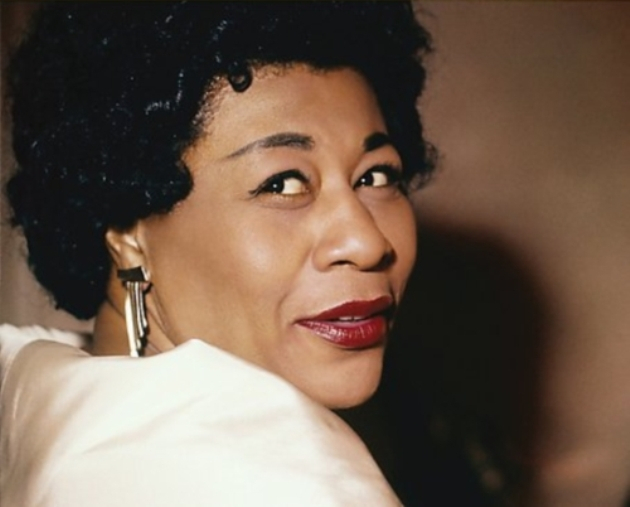ELLA FITZGERALD
One of my earliest musical impressions was her.
At twelve years old, on my little turntable, I discovered this singer while listening to my father's vinyls.
"How high is the moon?" he would ask me, and together we would draw, with four hands – me, the moon, and my father – the scale to reach it.
"You see, Ella Fitzgerald has reached the moon," he told me. I didn’t quite understand, but I remained under the spell of this mystery for a long time: here was a slightly plump woman with a disarming smile, who seemed so familiar and natural when she sang, yet at the same time, she remained in the interstellar spaces that mere mortals could only access through her agency.
Duke Ellington was absolutely right when he said: "Ella is beyond category." I’ve always been indifferent to Billie Holiday, Nina Simone, who I discovered later, impressed me but didn’t touch my soul, and Sarah Vaughan appeared to me as a monument admired from afar. But Ella Fitzgerald moved me, and still does.
Jim Blackman, her last tour manager, said exactly what the singer Johann Michael Vogl said about his friend Franz Schubert a century and a half earlier: "She had no idea of the extent of her talent / This man did not even suspect the source within him."
If the fight against racism has often been instrumentalized and distorted, sometimes even becoming reverse racism, we must not forget the everyday horror that prevailed in the southern United States at that time. We, Europeans, will never understand the dogs unleashed against men who wanted to dine in a restaurant, the police beating a Miles Davis who sat on a bench reserved for whites, the henchmen of a Texan sheriff who came to harass Ella Fitzgerald before her concert, to imprison her after they found a deck of cards in her dressing room... How can we understand that, despite the glaring obviousness of her talent, it took the furious persistence of Marilyn Monroe for Ella Fitzgerald to finally sing at the Mocambo Club in Los Angeles? Ella Fitzgerald’s voice could have screamed continuously, like a wounded beast, it could have muted the accents of legitimate hate, like a fire fueling perpetual swing. But no.
Always a bearer of joie de vivre, despite the subtlety and melancholy in a thousand shades, Ella’s voice unfolds in the tone of a familiar conversation, and even her highest, most powerful notes, she does not reach them by shouting and staying on them for 37 years, like Simeon the Stylite atop his column, or the bel canto stars of the 19th century and pop starlets trying out three-kilometer vibratos. Ella unfolds her high notes with quiet power and immaculate purity, with a sort of solid conviction, making us feel that she could go higher, but that the music does not demand it. And the vibrato is not a natural element unleashed to make ignorant souls admire the organ, but a perfectly controlled means of expression, to color a note here, highlight a harmony there – as traditional musicians or learned baroque musicians do today.
It is especially this infinitely flexible phrasing of hers that enchants, always on the edge of risk, never losing to it. And this feeling of the music being created, which one also experiences when listening to Beethoven’s Trio in E-flat major (Archduke Trio).
There, before our eyes, the music emerges, simple and unattainable at the same time.
When Ella closes her eyes, it’s as if she goes far, far from herself, far from us. I always have the feeling that she is going to find the moon, to bring it back to us. "How high is the moon?" Only she knows…
What has always struck me is this absolute musicality, this always perfectly adjusted and flawless taste, an innate gift for someone who didn’t have the opportunity to refine their points of comparison through long studies. In the chest of permanent treasures and the true glories of nations that justify them in the eyes of the world, it is undoubtedly Ella Fitzgerald who brought, for America, what this great country had to offer the world at that time, despite the policemen with dogs who tried to prevent her.
Rather than listening to herself, Ella Fitzgerald listens to the music, and joins the source of it, with assurance that leads us beyond the note, the invisible of a reality, and the certainty that music precedes those who make it.


